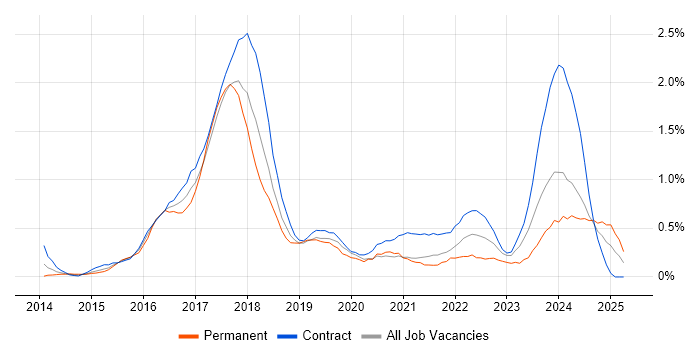Scala
Buckinghamshire > Milton Keynes
The table below provides summary statistics for permanent job vacancies advertised in Milton Keynes requiring Scala skills. It includes a benchmarking guide to the annual salaries offered in vacancies that cited Scala over the 6 months leading up to 2 May 2025, comparing them to the same period in the previous two years.
| 6 months to 2 May 2025 |
Same period 2024 | Same period 2023 | |
|---|---|---|---|
| Rank | 39 | 82 | 85 |
| Rank change year-on-year | +43 | +3 | +19 |
| Permanent jobs citing Scala | 1 | 7 | 2 |
| As % of all permanent jobs advertised in Milton Keynes | 0.39% | 0.64% | 0.24% |
| As % of the Programming Languages category | 1.18% | 1.98% | 0.63% |
| Number of salaries quoted | 0 | 3 | 0 |
| Median annual salary (50th Percentile) | - | £60,000 | - |
| Buckinghamshire median annual salary | - | £60,000 | - |
All Programming Languages
Milton Keynes
Scala falls under the Programming Languages category. For comparison with the information above, the following table provides summary statistics for all permanent job vacancies requiring coding skills in Milton Keynes.
| Permanent vacancies with a requirement for coding skills | 85 | 354 | 320 |
| As % of all permanent jobs advertised in Milton Keynes | 33.07% | 32.45% | 38.60% |
| Number of salaries quoted | 66 | 271 | 209 |
| 10th Percentile | £34,375 | £37,500 | £32,500 |
| 25th Percentile | £49,375 | £41,250 | £38,250 |
| Median annual salary (50th Percentile) | £60,000 | £54,000 | £52,500 |
| Median % change year-on-year | +11.11% | +2.86% | -4.55% |
| 75th Percentile | £66,563 | £58,750 | £65,000 |
| 90th Percentile | £81,875 | £70,000 | £75,000 |
| Buckinghamshire median annual salary | £60,000 | £52,501 | £52,500 |
| % change year-on-year | +14.28% | +0.00% | -4.55% |
Scala
Job Vacancy Trend in Milton Keynes
Job postings citing Scala as a proportion of all IT jobs advertised in Milton Keynes.

Scala
Salary Trend in Milton Keynes
3-month moving average salary quoted in jobs citing Scala in Milton Keynes.
Scala
Co-occurring Skills and Capabilities in Milton Keynes by Category
The follow tables expand on the table above by listing co-occurrences grouped by category. The same employment type, locality and period is covered with up to 20 co-occurrences shown in each of the following categories:
